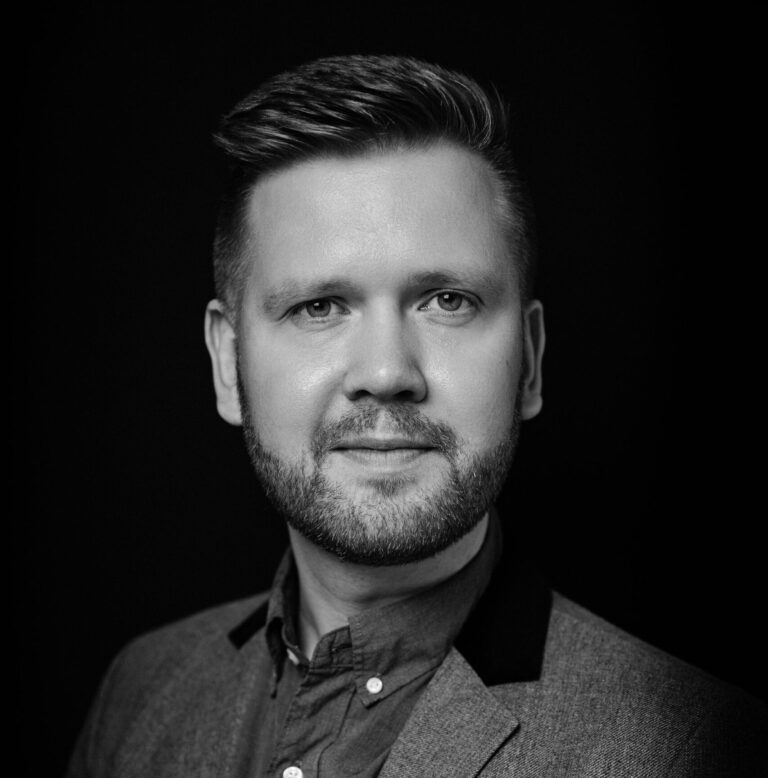Icelandic Filmmaker Erlingur Thoroddsen reflects on his latest horror film, ‘The Piper,’ that just premiered in Icelandic cinema.
With a new year comes new resolutions, new perspectives, new goals, but also new films. 2024 is set to be an interesting year in cinema; most notably because of the massive writers’s strikes of last year. A side effect of these historic strikes has meant that lots of film productions were delayed, shelved or even cancelled altogether, leaving the cinema going public wondering what to expect for this year.
January 2024 is gifting us with a new heightened horror film with fairytale roots, written and directed by gay Icelander Erlingur Thoroddsen. The Piper is an interesting modern take on the old tale of child abduction by magical, musical pest controller and GayIceland was lucky enough to sit down with the film’s writer and director, Iceland born Erlingur Thoroddsen to find out just how he managed to get his film made during such a trying time, what it’s like handing your script over to someone else, working with Icelandic literary royalty and more.
GayIceland: “Thanks for taking the time to chat with us. Can you tell our readers a little bit about yourself?”
Erlingur: “Sure, my name is Erlingur and I’m an Icelandic filmmaker. I lived in America for about 10 years. I went to film school in New York and then I tried living in Los Angeles for a couple of years and then when COVID happened I moved back to Iceland which, ironically, is the time when I got the most busy.”
GayIceland: “That’s interesting. Why do you think you got so busy after COVID?”
Erlingur: “A lot of the projects I’ve done since COVID, I had been setting up and hoping to get made in the years to come. I never thought all of that work would come to fruition so quickly but all of a sudden in 2020-21 the floodgates opened.
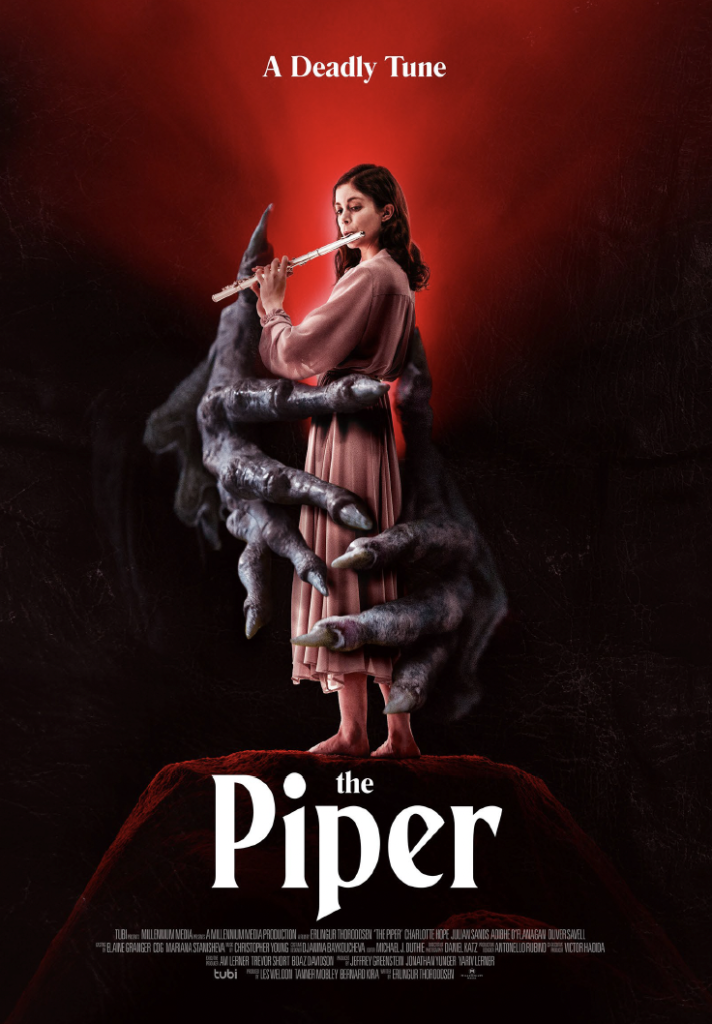
I think maybe because a lot of the work had already been done, but also because I think a lot of people got a bit nervous about the future so a lot of things that normally would have taken longer happened much faster. I think it was because people just had an attitude of, ‘let’s just do it now.’
I think a lot of production companies were looking at their slates and thinking ‘what can we actually do in this situation?’ I think because I work in the horror genre mostly, this was something in this time period that could actually get made. In fact, when I sold the script for ‘The Piper’ the company’s promise to me was that if I sell it to them, it will definitely be made; which is not always a given in the film industry. You never know if you can trust promises but they stood by their word and a year later we were filming.”
GayIceland: “So tell us about your latest film and its inspiration?”
Erlingur: “The Piper was one of the projects I was working on when I moved to LA. It was a script that I was sort of just writing for myself for fun. It was kind of born from two different ideas.
The first idea came to me before I went to film school. I was working as a stagehand for the Icelandic Symphony Orchestra. It was a great time for me and an amazing job but it did make me think about how I would like to do a movie that takes place in this world. Something that happens in the world of symphony and music, but spooky. That was the whole idea, I never came up with anything else.
In the 1200s in the town of Hamelin, all the children disappeared overnight and nobody really knows why. So the fairytale is sort of spun from this actual event. When I found this out it really added another fascinating twist to the fairytale.
The second idea came when I re-read The Pied Piper of Hamelin. It’s a story most people are familiar with but when you read it again as an adult, it’s actually very sinistre and unnerving. It’s a story that ends with this character playing his flute and leading all the children away and they just disappear forever.
I did some research into the fairytale and I found out something that makes the story even creepier; apparently the story is based on something that actually happened.”
GayIceland: “Really!?
Erlingur: “Yeah. In the 1200s in the town of Hamelin, all the children disappeared overnight and nobody really knows why. So the fairytale is sort of spun from this actual event. When I found this out it really added another fascinating twist to the fairytale. When I learned about this, it really hooked me to the story.
So I started thinking, what if this did actually happen? What if the Pied Piper and the melody he played was real. And if he could lead all the children away by playing his flute, what would happen if a symphony orchestra played his music? That was the genesis of what is now ‘The Piper.”
GayIceland: “Do you have a favourite memory from shooting the film?”
Erlingur: “It was a very challenging shoot. We shot for only 26 days in Sofia, Bulgaria. The movie I had made before that was shot in 18 days, so I was used to short schedules but, saying that, the previous film I made (Rift) was written to be shot in 18 days; The Piper wasn’t written to be shot that fast. It was a little bit bigger.
When you consider all of the moving parts like all of the cast, special effects, and an entire symphony orchestra. There are so many elements that take so much time logistically to arrange so we were always racing with time. But I think one of my favourite moments was working with the symphony orchestra and hearing them play the music for the first time.
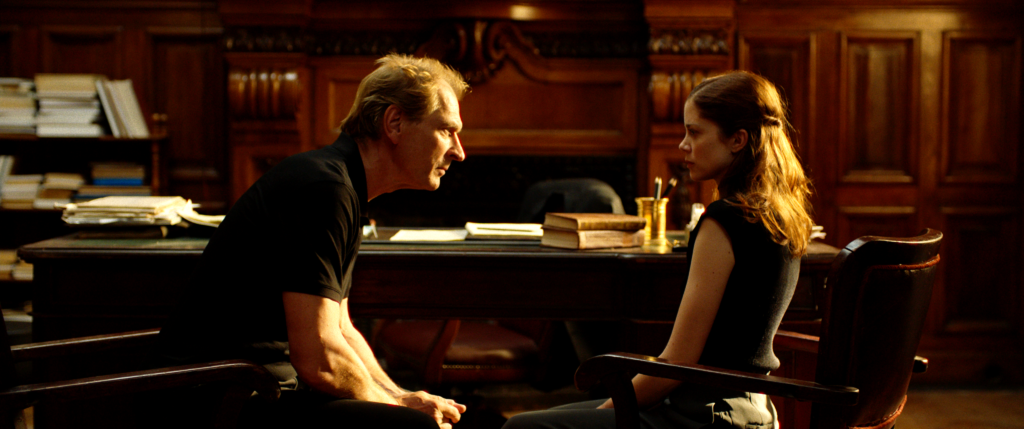
The music was composed by Christopher Young (Hellraiser, Sinistre, The Emptyman, Pet Semetary). In the film there’s a concerto that’s integral to the story. Christopher had to write it before shooting and I had only ever heard the demos and a piano version since everything was happening so fast. I heard it for the first time with everybody else, played by the orchestra, on set. That was a really awesome day. There were many great things that happened on that set, but I think this is one that really stands out.”
GayIceland: “What’s your typical process when coming up with an idea for a story?”
Erlingur: “It’s very random. Some ideas I have carried for a really long time and I don’t really remember how they started. Some come to me when I’m taking a walk. I try not to search for the ideas too much. I try to kind of let them just come. That’s worked well for me in the past. I’ve never really had a moment where I don’t know what to write. More often I find it hard to decide which one to write next. I guess that’s a good problem to have.
As I said, some ideas have been with me for years and I tend to think that if an idea has stayed with you for a long time it’s probably worth writing about. I have also had ideas that seem cool and then when I start working on them I realise that there’s not enough there and maybe I need to wait. So I think the good ideas usually stay with you and the bad ones tend to just fade away.”
Maybe because Rift was so heavy, I went into writing Midnight Kiss with the intention of making something lighter.
GayIceland: “So you’re ok with ‘killing your babies’ so to speak?”
Erlingur: “Oh yeah, I’m fine with that. Especially in the writing stage. If something doesn’t work and I like a scene, I’m fine getting rid of it because I’m able to tell myself that I might be able to use it for something else, even though I probably won’t.
For me it’s much harder to cut a scene out of a movie that I’ve filmed, because once that happens, the scene is definitely gone.”
GayIceland: “Traditionally you have been the writer and director on a lot of your projects. When you write, do you usually have the intention to direct the work and is it easy to hand your script over to someone else?”
Erlingur: “When I write something I am usually writing with the intention to direct mainly because I’m used to it. In the case of ‘Midnight Kiss’ that was a little different.”
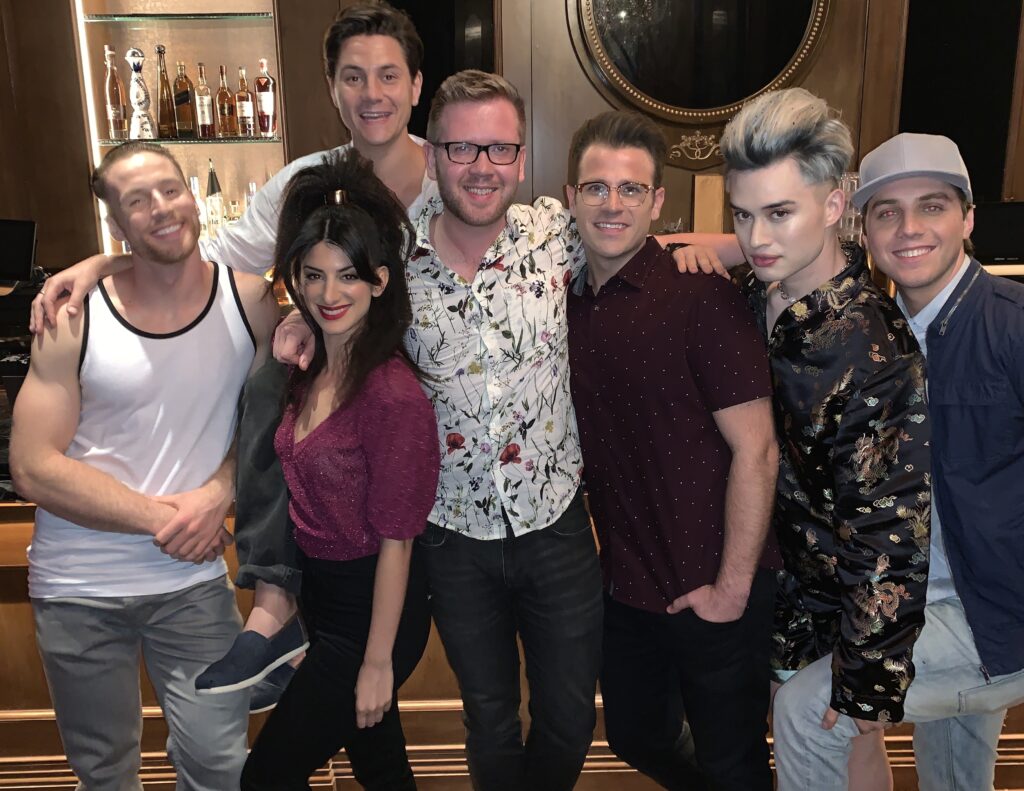
Erlingur wrote the script for ‘Midnight Kiss,’ a New Year’s themed queer slasher that was part of Blumhouse’s ‘Into The Dark’ series on Hulu, starring Scott Evans and Lucas Gage. It was directed by Carter Smith (Swallowed, Jamie Marks is Dead, The Ruins).
Erlingur: “Even though it was my idea, it was something I pitched and then I got hired to write it. I knew before I wrote it that I wasn’t going to be directing. It didn’t really change the writing process too much. When I write, I’m always visualising how I will shoot it too which can sometimes create blocks if I want to write something but I’m not entirely sure how I will shoot it.
I guess the biggest difference with Midnight Kiss was that in those moments when I wasn’t sure how to shoot something, I would at least know what I want to happen and then Carter can figure it out. [laughs]. Or he will be like, ‘What the hell is this?’
We had a really good relationship so if he didn’t understand something or wanted to change anything he would just call me and we would figure it out together. It was also really easy to give that script to him because I was already a fan of his work. Having had such a good experience with him, I wouldn’t be afraid of doing it again if it came up.”
GayIceland: “You tend to work a lot within the horror genre but all of your films are very tonally different. For example, Rift is a very heavy, sinistre and tense film that’s also quite sad; on the other hand, Midnight Kiss is a fun, self-aware slasher. How do you decide what kind of tone your script will have?”
Erlingur: “I think it’s very similar to the way the ideas come to me. I try not to think about it too much. The tone is almost baked into the idea.
For me, Rift always had that tone. I wanted to make a film that felt that way. The same thing with Midnight Kiss. Maybe because Rift was so heavy, I went into writing Midnight Kiss with the intention of making something lighter.
Slasher movies are one of the genres that made me fall in love with horror movies. Scream was probably my gateway drug into everything and I think it was definitely a big influence on Midnight Kiss. Scream is self-aware but in a very different way. The characters in Midnight Kiss are self-aware more in the context of the ways of our times.
I do think growing up in a country that’s full of myths and stories has made me very fascinated by them. Even in Rift, I mean there’s not necessarily myth in it, but the location they’re in, there’s something a bit strange and foreboding about the place.
Each project just presents its tone. I really try not to force it too much. But having said that, I do sometimes have the intention to make a specific kind of film. Like after Midnight Kiss, I wanted to do something a bit darker. With ‘The Piper’ I wanted to make something that was a bit more heightened. It’s based on a fairytale so I wanted it to be a little bit fairytale-ish.
I kind of like that about my films. Hopefully they all have something in common, but I like that they’re all very different.”
GayIceland: “How do you think growing up in Iceland has shaped your artistic vision as a filmmaker?”
Erlingur: “I don’t think there are any specific things that I do as a filmmaker purely because I grew up in Iceland but there are times when I’m writing where I think things like ‘this would only work in Iceland and wouldn’t work in an American setting.’ Or the other way around. Sometimes when I have that thought it makes me excited because it allows me to wonder, ‘what if I keep it in Iceland?’ or, ‘what if I keep it in America even though this wouldn’t traditionally work there?’
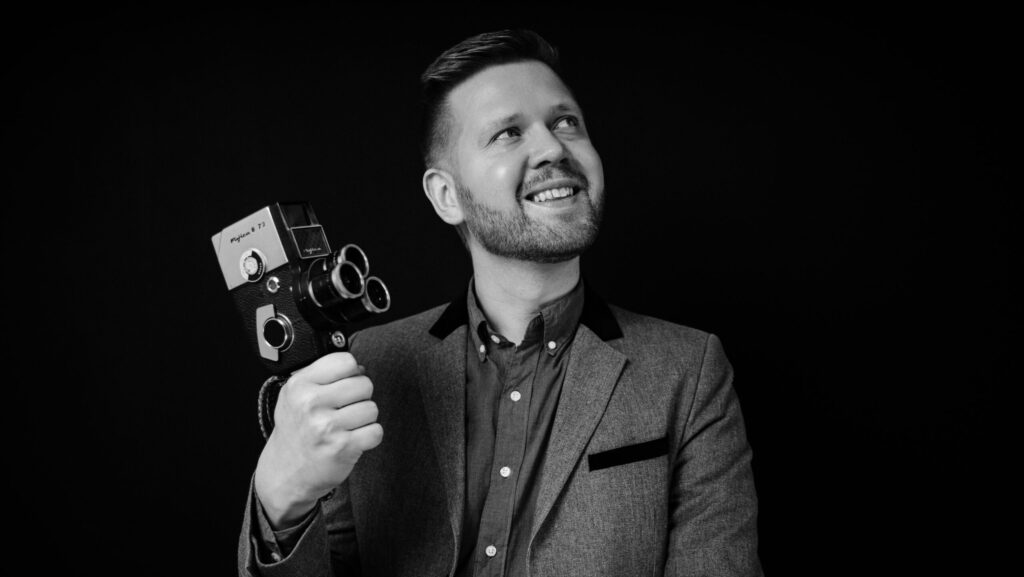
Often as a creative person, you can get a little bit used to things. It can be easier to just stay in the same lane as everyone else, but often the most interesting things you find are when you break out of the lane and do something unexpected.
I do think growing up in a country that’s full of myths and stories has made me very fascinated by them. Even in Rift, I mean there’s not necessarily myth in it, but the location they’re in, there’s something a bit strange and foreboding about the place. The Piper is based on a fairytale; I think these elements of storytelling are the things I’m drawn to and it’s probably because of where I grew up.”
GayIceland: “Speaking of Iceland, you also have an Icelandic film that came out called Kuldi (Cold) which you directed and you also co-wrote with possibly the most famous writer of scary stories in Iceland, Yrsa Sigurðardóttir. What was that like?”
Erlingur: “That was kind of amazing. Yrsa wrote the novel. She wasn’t really involved with writing the script other than reading a draft before we shot which made me incredibly nervous because I had made some changes which is normal when you are adapting a book for screen. I knew she was going to read it at some point but I didn’t know when.
So one day I woke up to an email saying, ‘Yrsa has read the script and here are her notes.’ It was very dry. The email didn’t say if she liked it or not, so I had no idea what her notes were going to be. So I was stressed that she would hate it. Originally in my mind I had intended to write her this nice email explaining everything, telling her why I had changed certain things; but I didn’t get the chance to actually do that.
So I waited a whole day to read her notes because I was so nervous. When I finally did open her notes, they were the best kind of notes a screenwriter could get. It was all very technical, story-based feedback that would make the script better. It was perfect. When I finally got to meet her; she’s so generous with everything. At the premiere I said that there was only one person in the audience that I hoped really did like the film, and it was her, and she loved it.
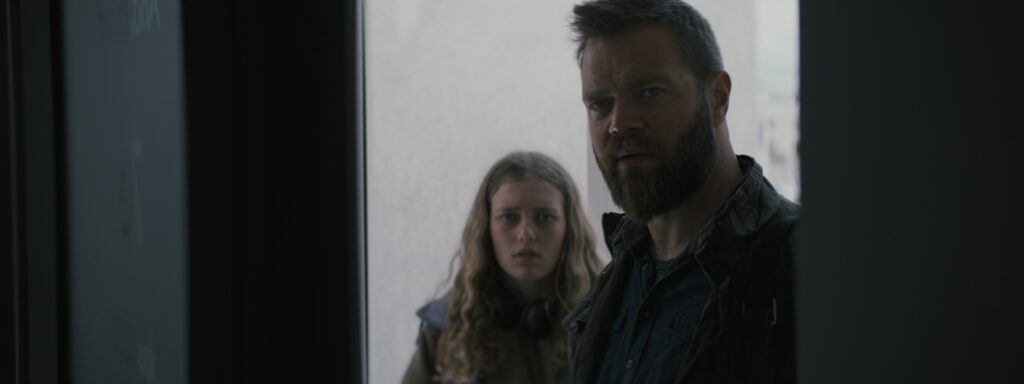
The book will always be hers, nobody can take that from her. I think Yrsa is just really happy to see her story be out there in a new way and for more audiences to potentially have access to her work.
Kuldi came out last year in Iceland and it was very successful. I haven’t done the maths but the opening weekend of Kuldi was almost four times the total audience of Rift in Iceland. It felt very good. I mean it didn’t feel so good at the time that Rift came out [laughs]. Nobody saw Rift in Iceland.”
GayIceland: “We saw it.”
Erlingur: “Thank you. But to be honest, I think the right people saw Rift, and I never would have gotten Midnight Kiss or anything else I’ve done since, without it.”
I think sometimes when you’re in the grind of things it’s easy to lose sight of what you’ve actually been able to achieve. I do have to make a conscious effort to remind myself that I am, in fact, in the place where I set out to be.
GayIceland: “Many artists work really hard for careers dreaming that one day they will be a paid professional and you have done it but I wonder, was there a moment where you took the time to realise that you’ve achieved what you dreamed of doing?”
Erlingur: “I think I actually have to remind myself sometimes to stop and think about what I’ve achieved. To think back on where you are now compared to two or three years ago. There’s always a struggle. I think sometimes when you’re in the grind of things it’s easy to lose sight of what you’ve actually been able to achieve. I do have to make a conscious effort to remind myself that I am, in fact, in the place where I set out to be.
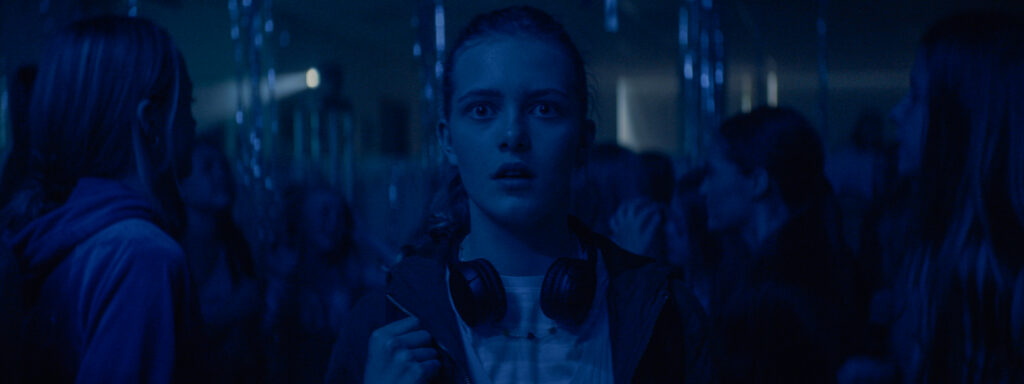
When you work in the creative field, I think it’s healthy to be looking towards what’s next. I think if I ever felt like I had done everything and completed everything, I wouldn’t have any passion to move on to the next step. I think the biggest struggle for creative people is to remember to take the time to enjoy where you are, not just be looking to the future.
But I think the first big moment for me was when I first got a cheque for writing something. The thing I wrote actually hasn’t come out and maybe never will, I don’t know. I remember going to pick that cheque up from the studio. It was in Beverly Hills.”
GayIceland: “You decided to pick it up in person?”
Erlingur: “I did! Mainly for two reasons. The first reason was that I wanted to have that experience. I wanted to go pick up my first cheque from the film studio. The second reason was that the studio wrote the check right before the christmas break, so if I didn’t pick it up in person I would have to wait till the new year to receive it in the mail. I was about to go to Iceland, so I wanted to have it before I left.
I remember I was going to keep the cheque forever, after I cashed it of course. It wasn’t a huge amount of money. Not life changing. It wasn’t like I didn’t have to work again, but it was the first time that somebody had actually paid me a decent amount for writing which felt good. It was like ‘ok so this is a thing, and it’s happened once now so maybe it will happen again.’
But, you know, the imposter syndrome is still there. It gets quieter but it never really goes away completely, but I don’t think that’s a bad thing.
If you think you’re the best and you’ve done everything, then why continue? There has to be something driving you to be better.”
GayIceland: “In your previous films Rift and Midnight kiss, there has been some queer representation, did you ever experience any push back when getting those films made, because of this?”
Erlingur: “No it was actually the opposite. With Rift it was very independent, there were very few people involved in the making of it so there wasn’t really anyone to actually have that pushback. I also think Rift came out at the perfect time. It came out around a time when queer horror was starting to become a thing. It’s become much more of a thing since then, but at the time, a lot of film festivals and a lot of critics were realising that there’s a bunch of people doing a similar thing in this space and they noticed Rift because of that.
With Midnight Kiss, the only reason I even got into the room with Blumhouse (the studio) to pitch that was because of Rift. I came in there as the gay horror guy and that’s what they wanted. They were looking for queer horror pitches. So I came there with the midnight kiss idea and they loved it. If anything, they wanted me to add more gay. The first draft of Midnight Kiss was… I don’t want to say tamer, but it didn’t have all the butts in it. It was a little less risqué; but Blumhouse wanted more and Carter (the director), he’s very into the nude male body and when he took over, he pushed it even further and I loved it.
The first draft of Midnight Kiss was… I don’t want to say tamer, but it didn’t have all the butts in it […] but Blumhouse wanted more and Carter (the director), he’s very into the nude male body and when he took over, he pushed it even further and I loved it.
Even when I was writing it, I felt like there were things that wouldn’t get done because I thought it would be too much but I was wrong, they wanted more. I think sometimes we stop ourselves because we worry things will be too much for people instead of just going there. That’s when I learned to just go there and wait for them to tell you to stop, don’t stop yourself. It’s always better to go too far and have them reel you back, than it is to not go far enough.”
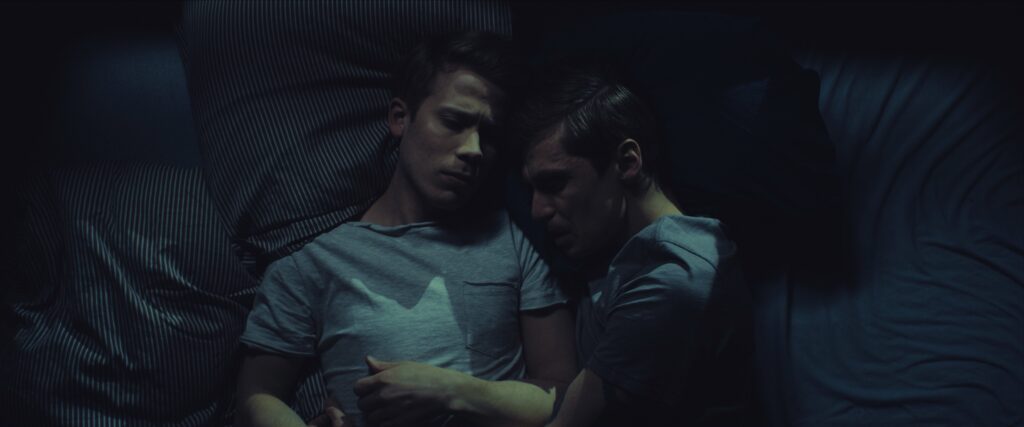
GayIceland: “Why do you think queer people are drawn to the horror genre?”
Erlingur: “I think the most obvious reason is that some queer people see themselves as either the misfit, outcast lead of the film or the monster of the film. Whether it’s the hero or the villain or both, horror films play on these ideas of not belonging. Like there’s something wrong with someone so they have been cast out by society. I think queer people connect with this on an unconscious level. Of course in horror movies, sometimes it’s very overt, but I also think sometimes it’s much deeper than that.
Also, horror films can be very flamboyant, they can be very over the top. They can push the limits in the same way that a lot of queer culture does. I mean, there’s a whole other conversation we could have about why queer culture does that, but I think in a lot of ways it’s to poke at the norms. To demonstrate that we don’t have to fall into traditions, we can do something else. We can do it bigger and louder and better or however we want.
I really think horror as a genre is very similar. Horror is over here with us, saying, ‘I don’t want to be in the mainstream. I want to do my own thing’.”
GayIceland: “What Queer Horror Movies do you think everyone should see?”
Erlingur: “Knife + Heart is a great film. I really like this French film. It has the slasher element but it also has the Italian Giallo element too. The other film that comes to mind isn’t really horror but Cruising by William Friedkin starring Al Pacino. I guess it’s more of a thriller but it does have its horror elements and William Friedkin has done his fair share of horror in the past. This is also a film that’s one part frustrating because it’s so deliberately ambiguous and deliberately withholding of answers, but it’s a film that I need to watch every few years and each time I get something different from it.
Again, this one isn’t typical horror, but I love Stranger By the Lake which is another French film. If I’m allowed another I would say Dressed to Kill, which is a very problematic early 80s sex thriller by Brian de Palma. If you watch the film with today’s eyes it hasn’t aged well but at the time it came out it went to a place filmmakers didn’t really go before. I don’t necessarily think it was in the best way but it’s an interesting film to look at for this period of history. I saw it a few years ago on a big screen in LA and realised it’s a ‘movie’ movie. Like it’s a real film. I had only ever seen it on TV or DVD and seeing it in a cinema was a big experience.”
I guess one thing that has been in the press is the American remake of Rift. It has now been going on for a long time but that’s often how these projects go. It’s still alive and has been put into the hands of the right people.
GayIceland: “What’s next for you?”
Erlingur: “There’s a few things on the horizon that are in various stages of development. Unfortunately there isn’t really anything I can talk about, not because I’m not allowed to say anything but just because I don’t know when or even if they will be completed. There’s a few things in Iceland, a few in America.
I guess one thing that has been in the press is the American remake of Rift. It has now been going on for a long time but that’s often how these projects go. It’s still alive and has been put into the hands of the right people. With COVID and the writers’ strikes last year, sometimes it makes me feel like it’s a cursed script because something keeps happening that slows down the progress, but it’s got a good team behind it and it will get to where it needs to go.
I’m also working on things that aren’t horror and are more queer that I’m really excited about. I just feel that even though I can write about lots of different things, when I’m writing queer characters and stories, it feels very comfortable because it’s the world I know the best.
I mean even though The Piper isn’t queer, I think it’s definitely very gay.”
The Piper is beginning its release schedule as of January 2024, so keep an eye out on your local cinemas and streaming platforms for it.

